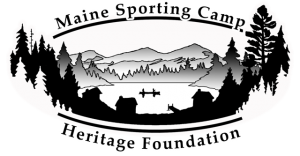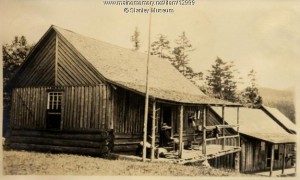The Foundation’s mission guides our loan and investment decision-making. The Foundation assists sporting camp businesses so they can economically contribute to the community, employ local workers, are environmentally responsible, and provide the public with the unique culture, heritage and outdoor experiences that sporting camps have preserved for well over a century.
The Foundation provides financial assistance that will provide an opportunity for sporting camps and local businesses to become self sustainable. Loan applications include a business plan and repayment plan that demonstrates the business can generate a viable and sustainable financial return, either by maintaining or creating profits, return on investment or a tangible asset.
The Foundation provides financial assistance that will:
- Preserve the “Maine Sporting Camp” culture, heritage, architecture and outdoor traditions that began in the mid-1800’s, and were documented by many such as Henry David Thoreau.
- Provide an opportunity for sporting camps and local businesses to become self sustainable, improve the economy of depressed regions of Maine, and to bring a positive change for the borrower, the area’s unemployed, or seasonally employed. We are interested in the long term employment potential of each loan or investment and we ask our borrowers to work with staff to open new job opportunities to those who are in need of employment. For example, we look to assist businesses that plan to hire and train new employees, train/hire/apprentice local youth, or improve part-time or seasonal positions to full-time or year-round employment.
- Protect and improve the stewardship of natural resources, so it may be enjoyed by the public and become an economic asset to the local area. The Foundation is committed to helping sporting camps succeed while preserving the quality of Maine’s environment. One depends upon the other. We encourage and help sporting camps to identify the ecological aspects of their surroundings, and to developing practices that benefit both the environment and the business’ bottom line. Our interest is in assisting businesses that provide services that are environmentally friendly and sustainable.
- Generate a viable and sustainable financial return, either by maintaining or creating profits, return on investment or a tangible asset.
Fee Acquisition of Leased Land
Many traditional Maine sporting camps in northern Maine are located on leased land. Virtually all of Maine’s northern forest is owned by private industrial interests. Property owners were predominantly Maine-based lumber, pulp and paper companies that would harvest timber to supply their own mills.
These companies would lease camp lots on lakes, ponds, rivers and other desirable locations within their property to local families and persons associated with the company. Historically, these leases provided very low rates and extended terms as long as 99 years in some cases.
Presently, landowners are no longer willing to enter into long-term leases. In fact, virtually all camp leases now renew from year to year, which means that they can be terminated by the landowner. Under these circumstances, the owners and operators of sporting camps located on leased property are unable in virtually all instances to secure commercial financing for projects such as capital maintenance and improvements. Banks are simply unwilling to take a mortgage interest in leased property, because in the event the landowner terminates the lease, the bank would lose its collateral. The Foundation only provides loans to address circumstances such as this, where camp owners or operators are not able to obtain commercial financing.
In some instances, if a landowner decided to sell a lot on which a sporting camp was located under a lease arrangement, the Foundation will consider purchasing the lot and leasing it back to the camp owner or operator under a long-term lease. Without the specter of termination by the landowner, camp owners will have sufficient collateral to qualify for commercial financing when and if they needed it for operations and infrastructure.
Typical Loan Structure
Each loan is structured depending on individual business needs. The terms of each loan depends on how the funds are to be used, as well as the assets used for collateral. The three main uses of funds are for working capital (operating costs), building and equipment needs, and real estate purchases.
Interest Rate
Interest rates are determined by the current market, project, risk, and other qualifying factors.
Loan Application
Application forms are being developed as appropriate for the type of assistance requested. Applications will conform to guidelines of area banks, loan programs offered by the Small Business Administration and US Department of Agriculture, and the Foundation’s partner organizations. For example, applications will be very similar to that of our partner organization, Coastal Enterprises (CEI, Inc.).
To apply for a loan, applicants are typically expected to submit the following:
- Loan Application
- A complete business plan, which includes all items outlined in an Application Checklist. Foundation staff or partners will help applicants with their business plan.
- Tax returns for the most recent three years for the business or the business being purchased, including the depreciation schedule.
- Personal tax returns for the applicant(s) and any guarantor(s) from the three most recent years.
- A year-to-date Income Statement and a current Balance Sheet for your business or the business you are purchasing.
- A current personal financial statement for the borrower(s) and guarantor(s).
Emergency Loans
The Foundation will consider appropriate provisions for very small and emergency funds so they may be provided without excessive administrative burdens or costs. These are often termed “Micro Loans” by the Small Business Administration. Although these may be expedited, there will still be sufficient review to assure the funds are properly and fairly dispersed.
Partnering with Coastal Enterprises (CEI) for SBA 504 Loans
In 1981, the U.S. Small Business Administration (SBA) launched the 504 Program to help small businesses reach their full employment potential. It is a fast-growing, flexible business finance program. SBA 504 loans are for businesses to build or improve their fixed assets – mainly real estate and equipment. The terms of the loan are 20 years for real estate and 10 years for equipment. CEI is licensed as a Certified Borrower by the SBA to administer the 504 Program in Maine, and is the largest community development corporation based in Maine.
The SBA 504 program is an ideal way of financing properties and equipment with a lower down payment than many banks offer. Businesses are also able to lock in their financing at a fixed rate of 10 or 20 years.
Eligibility for SBA 504 Loans
Almost all for-profit owner-operated Maine small businesses are eligible. The 504 Program can lend you up to 40% or up to $1,500,000 and go up to $2,000,000 (in certain conditions) of the total financing. The tangible net worth of the business cannot exceed $7 million and the previous two years net profit after taxes cannot exceed $2.5 million.
Minimum project size: $125,000
Eligible Uses of SBA 504 Loans
- Land acquisition and improvement
- Building construction and addition
- Purchase and/or remodeling of existing buildings
- Purchase and installation of machinery and equipment (must have a useful life of 10 years or more)


